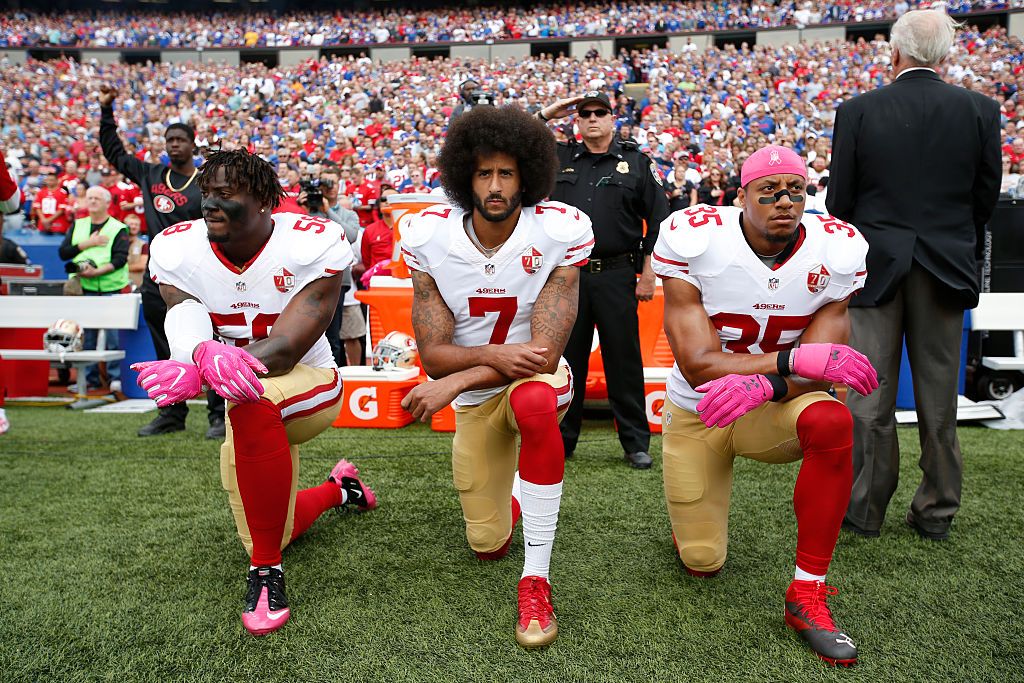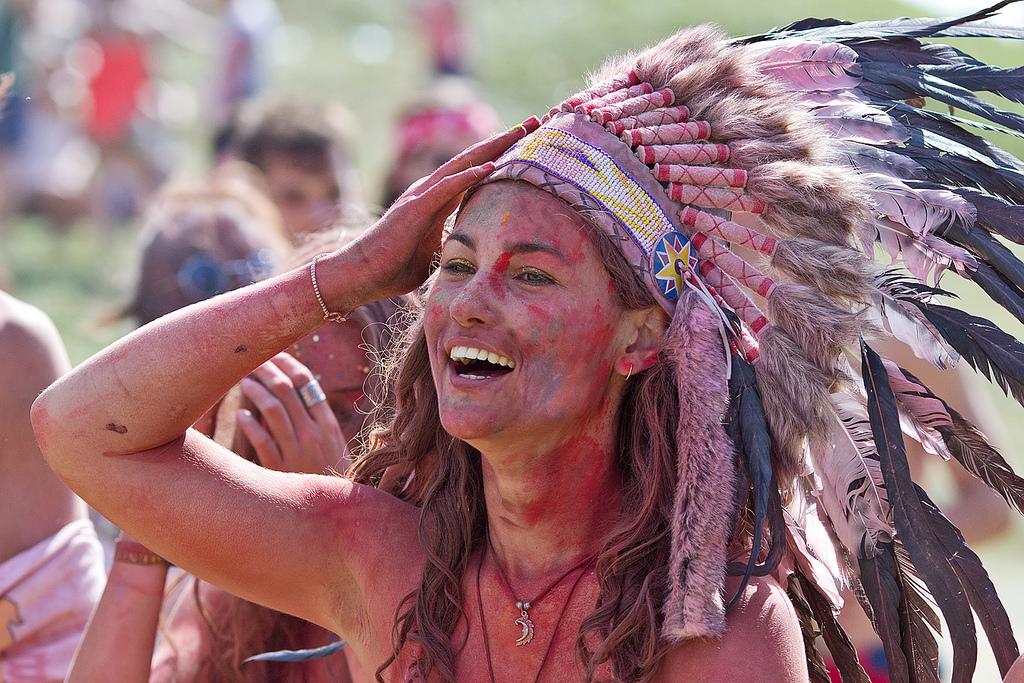It used to be that the world tuned into the Super Bowl as much for the commercials and performances (especially during Half Time) as they did the games. Sadly, Sunday's showing proved that the NFL's entertainment drought continues, leaving viewers parched for some quality performers.
Of course, there's no shortage of performances to pick from, be it Janet Jackson's infamous "Wardrobe Malfunction", the Who's tone deaf performance, or this year's offering from Usher. However, there have also been some pretty spectacular shows too over the years such as the legendary Paul McCarthy and Prince performances.
One of the key problems is that in times past, there was a general equality of respect in the various musical genres, ranging from rock, to Motown, Pop, and Country. Nowadays, it seems that just one market segment is even considered. But like many others facing this country, there is a divide which seem ever more insurmountable.
The NFL's selection of a very narrow band of performers does not appeal to the majority of fans, especially those who are willing to plop down the big dollars, either in the form of season tickets or one of the numerous viewing methods. If it wasn't for those fans, the NFL would quickly find itself unable to keep paying out those multi-million dollars salaries to players, coaches. and administrative staff.
One seriously problem is the apparent growing willingness of the NFL to allow a measure of racism which it wouldn't tolerate from any other group. It originally began with a few players deciding to "take a knee" rather than stand for the playing of our National Anthem (the players claim it was a protest against racial injustice).
This relatively small clique, which revolved by then San Francisco quarterback Colin Kaepernick, had decided to interject their race based political beliefs into a sporting event. The practice quickly spread into other sports venues, and down to high school and Pop Warner leagues (further proof that children and young adults often emulate what they see more so as a form of "hero worship than an understanding of issues).The clap back came swift and hard from the fan base. Fans made it clear that they were there to watch a sporting event, not attend a political event. This was particularly among law enforcement and veteran associations despite denials from the NFL to the contrary. The general consensus was that if players want to make political statements, they should do it on their own time, not on that of the fans.
The NFL lost nearly 1/3 of its viewership and took a hit of $8.1 billion dollars in revenue. Other sport leagues and associations face similar drops in the revenue. I imagine that whoever in NFL management who opted to do nothing about the kneel downs found themselves with a pink slip in hand fairly quick. No one take hits in the billions without heads rolling.
While the issue of "taking a knee" during the playing of our National Anthem, has largely faded from the public's mind along those responsible for triggering the movement, but it didn't end there. Not by a long shot.
Today we face another attempt to politicize sports through the playing of the so-called "Black National Anthem" as the song, "Lift Every Voice and Sing" has been coined. It's being performed increasingly at various professional sporting events around country, and as with the copycat kneeling, has begun to spread into colleges and Pop Warner games. More so, the media is often encouraging attendees to afford the same level of respect as the actual National Anthem.
The song, "Lift Every Voice and Sing" was a hymn written by NAACP leader James Weldon Johnson around 1900 and set to music by his brother, J. Rosmond Johnson. James Johnson, who was Chair of the Florida Baptist Academy, penned the hymn in honor of Lincoln's birthday.It was pointed out that during the last Super Bowl game, attendees were urged to stand for the Black National Anthem, but not for the American National Anthem. Was that a one off mistake or was that intentional? Later, leading Democrats were critical of the crowd for not standing enmasse.
As an aside, when Andra Day sung the Black National Anthem, she was roundly booed by the audience which was audibly suppressed and downplayed by the media commentators while praising the NFL's openness. Meanwhile, country music star Reba McEntire received a rousing round of cheers and applause in response to her rendition of the National Anthem (am I the only who thinks Reba looks like a caricature of a poor country mouse?)/
While the sentiment of the song is noteworthy, the question of whether a country can or should have two national anthems, especially one seen as promoting a certain racial segment of its society needs serious debate. It's not as if this is a choice between "America the Beautiful" and "If I had a Hammer". This is especially true given how deeply divided America has become across political, gender, economic class, educational, and racial lines.
According to several surveys and polls conducted by Pew and Gallup, America has never been this deeply or widely split over even basic issues since the decade preceding the America's bloodiest war, the Civil War. That war resulted in deaths of over 620,000 mostly young men. That's more than the Revolutionary War, War of 1812, the Mexican-American War, the Spanish American War, WWI, WWII, Korea, or Vietnam...combined!
Lately the public has shown a willingness to use economic and social media pressure to respond to bad corporate decisions. As mentioned earlier, the Kaepernick Fiasco resulted in the loss of $8.1 billion dollars in revenue not to mention ending a number of professional sport related careers.When Budweiser began its promotion of "transgender influencer" and TikTok personality, Dylan Mulvaney in 2022, "Bud" had long reigned as America's top selling beer and was especially popular at sporting events. It was even referred to as "blue collar beer". Anheuser-Busch, the maker of Budweiser, reported a quick kick in its most tender spot---its bottom line.
During the second quarter, from April to June 2023, its revenue dropped a numbing 10.5%, especially sales of Bud Lite. That reflected a loss of $395 million in North America sales. Stores couldn't get rid of the stuff no matter how low it cut prices. Drinkers of the stuff saw Bud's promotion of the transgender activist as a not-so-subtle promotion of LGBQT values, and in particular, those revolving around transgenderism, which highly unpopular among conservatives.
Boycotters made it a point to frame their protests as a personal violation of their trust to their long standing brand loyalty. "Bud" had long been associated with conservative ideals . The fall out later spread to include Target and country singers Garth Brooks, Kid Rock and several others. But how different is this than the attempted boycott over Chic-fil-a's refusal to be opened on Sunday?
Conservative musical performers, athletes, and event promoters dropped Budweiser product from the lineup (some of largest consumers of Bud also happen to be NFL fans). As a result, after being America's top selling brand for over 20 years, it was toppled by a Mexican lager, Modelo Especial, which is owned by the Belgium company ABInBev. Think about that. A beer which had been accepted as the essential working class American beer being replaced by a Mexican brew! Meanwhile, Anheuser-Busch reported that two of their top marketing executives were place on a leave of absence.
Three current examples, which by themselves and perhaps at some other time would have captured nothing but dead air time. But other examples exist such as alleged "cultural appropriation" of hairstyles, types of jewelry, and clothing styles. Even the use of certain phrases can serve as a trigger event! But, given America's deep division and hypersensitivity over nearly everything, should any of this be considered a proper venue for corporate social responsibility?Even after a year since the "brew off", profits and market shares at Budweiser remain down. Despite Wall Street's never ending chase for more market share and more profits at any cost, shouldn't we address whether boards of directors be giving the green light to delve into socially sensitive issues? Are they showing due diligence to their stake and share holders?
On the other hand, there are those who believe that corporations have a unique "moral responsibility" when it comes to the environment and society. Does the ruling oligarchy still retain a sense of "noblesse oblige" to society?
After all, there are corporations out here who have greater revenues than some countries, and thus greater resources for social change. Corporations are commonly typically more influential than any NGO. The top ten richest companies, if combined, would be the third largest financial entity behind the U.S. and China. Saudi Aramco generates more wealth than Italy, Brazil, Canada, and Russia. Apple's market capital is the size of Australia's GDP.
America, as most of its citizens have come to accept, is a neo-fascist corporatocracy managed by a relatively small handful of super rich oligarchs. Corporate media serves as its mouth piece in ensure a continuous and unrelenting stream of propaganda promoting one agenda or another. But does Wall Street want to get into the "social reimaging" game? The public has demonstrated that it can and will respond to the wrong message just as quickly as to the proper one.
So, if we're to have a "Black National Anthem" being promoted as a substitute to our collective national anthem, will Corporate America give equal thrift to a "Hispanic National Anthem"? What about a Asian-American National Anthem or a Native American National Anthem? Then too (I have to ask), what about a European-American National Anthem? Maybe we should adopt corporate anthems like in the 1975 dystopian movie "Rollerball" (a similar theme was played out in the 1986 film "Rollerblade".
How will they respond to the growing population of Muslims without offending other religions or victims of Islam such as the Kurds or Coptic Christians? What about commercials which promote legitimate Muslim traditions or values but which also comes in conflict with Western values such as the role of women?Hispanics already represent the largest national minority and growing. Some studies indicate that American will skip pass racial parity with white Europeans and go straight into a Hispanic majority within the next two decades. How will Wall Street handle that transition without disrespecting other racial groups?
Corporations have worked long and hard to achieve control of our political system. Now it's going to have to face up to some of the same issues our Republic struggled with. The chief difference is that the public will have more arrows in quiver. Not only through boycotts, social media "shaming", internal protests, and challenges via stockholder meetings. Corporate America many caught itself in a trap of its own making in its quest for profit and control.
If you enjoyed the
article, please consider passing it along to others and don't forget to
subscribe. It's free! Lastly please be sure to "like" us on
whatever platform you use to read anotheropinionblog.com. It helps beat the algorithms and keeps our articles
in circulation. Thank you!
Democrats criticizes Super Bowl Crowd for not standingduring Black National Anthem
The Companies More Profitable Than Countries
Bud Lite boycott takes fizz out of brewer's earning
Behind the Backlash Against Bud Light
Garth Brooks' Bud Lite scandal takes to new turn






No comments:
Post a Comment